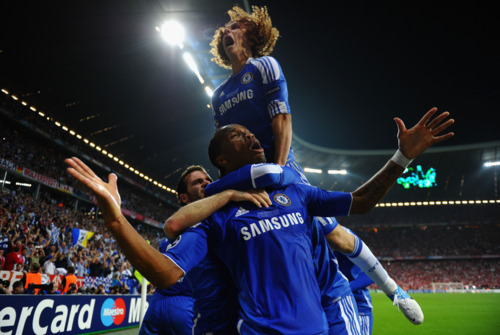On Chelsea and deservedness
On Chelsea and deservedness


By Max Grieve
Munich rocked; the Allianz Arena shaking in anticipation of the final whistle. It would come, as it always does, but brought with it a fresh burden. Drogba rose to meet the corner; Drogba fell back to earth, and sent millions into raptures. Thousands watched on in the city centre as the boom broke, and the Bayern support were plunged into a silence.
Deeper still into the match, Chelsea must have sensed that their remarkable run of fortune had come to an end. Beyond Robben’s missed penalty, Bayern found themselves 3-1 up in the shoot-out. Then, the tired clichés of Germany and spot-kicks collapsed. Ivica Olic was denied, and Bastian Schweinsteiger smacked his shot against the post. John Terry was safely confined to the stands, and Dider Drogba, rather than slip at the crucial time, sent Neuer the wrong way with cold perfection.
To a point, the result seems wrong. Chelsea won; their name was being engraved on the trophy as Drogba’s penalty settled in the back of the net, but it was always in Bayern’s control. Said Jens Lehmann following the loss to Dortmund last week; “I can’t see them making this many mistakes again. They’ll play with anger and even more determination. I’m rather optimistic about their chances.”
Neither was reflected in Bayern’s approach, and they lost. There must be an admiration for the character showed under such phenomenal intimidation, in this match, and those preceding it. Down 3-1 from the first leg in Napoli, they scored four at Stamford Bridge. They survived a late scare against Benfica. Then Barcelona came calling. The other view of Chelsea’s triumph in this competition is, rather than an appreciation of spirit, that they have surrendered any enthusiasm for playing the game in a way that might inspire the millions. It is a view that would suggest that Di Matteo instructed an “anti-football” strategy, and concludes that Chelsea were undeserving winners.
Except that they weren’t. Not at all. It is a football competition, the Champions League, and the rules of the game are the same (bar the allowed modifications) as they are for any football match played on the planet. Let us take the match against Barcelona; it is perhaps the most relevant example. Given the turbulent season that they have had, it seemed near impossible that Chelsea could progress against the best club side in recent times, and arguably in the history of football. Yet they did; and were roundly criticised for it. Faced with the most surgical, most beautiful, most awesome football played on the planet, what were Chelsea supposed to do?
“Anti-football”, as a concept, is illegitimate from the outset. If we disregard John Terry’s rush of blood to the head, Chelsea played entirely within the rules. The majority of the statistics favoured Barcelona overwhelmingly, but there were a normal number of fouls, and only a handful of yellow cards, over the two matches. Certainly Chelsea failed to play beautiful football, but to what point does beauty trump a result? There surely can’t be many football fans who would pass up the European Cup, or the league, for the sake of a few shouts of “olé”.
Chelsea did not travel to Munich to entertain; we should have known as much. Munich, likewise, did not take to the field with the ambition of playing what is considered by many to be beautiful football; indeed, those familiar with Jupp Heynckes’ style will know that Bayern rarely play with an established “plan”, as such. Rather, both sides were looking to win – they just went about it in contrasting ways.
They must have known that they would be pilloried for their style, but Fernando Torres was right: “The better side doesn’t always win”. Chelsea have won the Champions League often inspired by the undoubtedly negative catenaccio approach, but they have won it all the same, and it’s difficult thing to do. If we are to find a genuine fault with the way Chelsea achieved this victory, perhaps we should look to the hundreds of millions poured into the side and ask why they didn’t win it earlier. The answer is simple: money can buy sensational individuals, but it can’t buy an entire footballing philosophy – unless, of course, Abramovich is looking to uproot the Camp Nou and drop it on London.
Bayern, on statistics and the nature of the match, probably deserved to win. The fact is that they didn’t, and the world exploded in both outrage and ecstasy. After the final whistled sounded, the Bayern players and staff immediately went to their end-of-season function in Munich’s city centre, and partied like it was 1999. It’s a good joke, and one which Bavarian newspapers would have hoped to avoid. With it, they wrote of the injustice Bayern suffered at the hands of a team that displayed a brutal insensitivity towards a particular style of football. How dare they play in a way that might see them win!
To criticise Chelsea of playing “anti-football” is wrong; they are completely deserving of their victory. You would be forgiven for thinking that many people watched an entirely different match to the one at the Allianz Arena on Saturday night, which was played with a ball on grass, with twenty-two players evenly divided into two teams as the rules of the game dictate. Anti-football? Condemning it as such is anti-football in itself.







